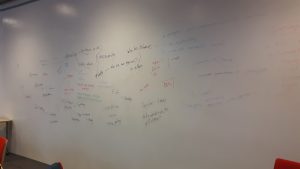First we were given the magic nametags which provide us the endless coffee at the cafeteria. Digital Humanities Hackathon 2019 has started. Then we were put in a small room full of strangers. Those strangers would not be strangers for long for we would study Brexit on transnational social media for the next couple of weeks.
Turns out we come from all over the world; China, India, US, Finland, Russia. We come from different educational backgrounds and most of us know nothing of studying social media. But we fear not – we have the support of our group leaders Daria, Joe and Steven, the data team and the general organizers.
But what is digital humanities? It is a field of studies that combines humanities and social sciences with computational methods to solve issues that interest humanities and social sciences researchers. The possibilities are endless. Not only can humanists now study larger datasets than before, the computer scientists can tackle humanities interests. We can study the digital world or use new methods to study history. On the other hand we all need to learn to work together.
Haven’t you always wanted to draw the wall full of mind maps? Well, we got to do that!

What is interesting about the Brexit phenomenon on Twitter during the spring of 2019? The due date of the UK’s separation from EU came and went and was postponed. Each of us took a stand one at the time and wrote on the wall what would be interesting to study about this phenomenon. Some of us were interested in applying specific methods to the data, some of us were interested in abstract contexts related to Brexit.
The brainstorming session was full of forgotten words, new concepts and methods explained. It was also full of new connections between subjects that none of us could see on our own. The session also caused a lot of anxiety, as the amount of new information was overwhelming. Taking a small break seemed to help to focus, as did voicing concerns and sharing the feelings we had.
Dealing with social media data raises a lot of ethical questions. Where do we draw the line what information has been willingly given to be seen and used? How do we anonymize the information we are using?
Deciding on one approach deemed hard. We all had so many ideas on what could be interesting in the data that making tough decisions on what to do seemed impossible. But once we all felt comfortable enough to voice their opinions we are making our way towards an actual research.
Next up – the research plan. Follow our journey in this blog and on Twitter with the hashtags #dhh19 & #brexit.
Written by Sonja Sipponen, MA student of general history at the University of Helsinki.
